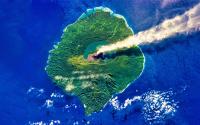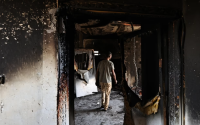Common Dreams / Published on Monday, November 13, 2006 by the Associated Press Charles J. Hanley
A long-awaited report by an international scientific network will offer much stronger evidence of how man is changing Earth's climate, and should prompt balky governments into action against global warming, the group's chief scientist said Monday.
The upcoming, multi-volume U.N. assessment — on melting ice caps and rising seas, with authoritative new data on how the world has warmed — "might provide just the right impetus to get the negotiations going in a more purposeful way," Rajendra K. Pachauri said in an interview midway through the annual two-week U.N. climate conference.
The Indian climatologist is chairman of the Intergovernmental Panel on Climate Change, a global network of some 2,000 climate and other scientists that regularly assesses the state of research into how carbon dioxide and other heat-trapping gases produced by industry and other human activities are affecting the climate.
In its pivotal Third Assessment, in 2001, the panel concluded that most global warming — temperatures rose an average 0.6 degrees Celsius (1 degree Fahrenheit) in the past century — was likely the result of such manmade greenhouse gases.
In its Fourth Assessment, to be issued in installments beginning next February, "there's much stronger evidence now of human actions on the change in climate that's taken place," Pachauri told The Associated Press.
The 1997 Kyoto Protocol requires 35 industrialized nations to reduce their greenhouse emissions by 5 percent below 1990 levels by 2012. The United States and Australia are the only major industrial nations to reject Kyoto. U.S. President George W. Bush contends the emissions cuts would harm the U.S. economy.
Here at the Nairobi conference, Kyoto parties are discussing what kind of timetables and quotas should follow that pact's expiration in 2012.
They also are weighing ways to draw the United States, the world's biggest carbon dioxide emitter, into a mandatory system of emissions caps. Many look toward the scientists' upcoming assessment for support.
"It's bound to have a major impact," Pachauri said.
He said the heavily detailed document will offer significantly more evidence on sea-level rise, the melting of glaciers and the growing scarcity of water. He didn't discuss those details, since the Fourth Assessment Report is still in the draft stage. But it may likely cite such recent research findings as:
_World temperatures have risen to levels not seen in at least 12,000 years, propelled by rapid warming the past 30 years.
_Greenland's ice mass has been melting at what NASA calls a "dramatic" rate of 170 cubic kilometers (41 cubic miles) per year, far surpassing the gain of 58 cubic kilometers (14 cubic miles) per year from snowfall.
_The levels of oceans, expanding from warmth and from land-ice runoff, have risen at a rate of about 2 millimeters a year between 1961 and 2003, and by more than 3 millimeters a year in 1993-2003.
Pachauri said increasingly powerful supercomputers allow scientists to run more accurate models of future climate. The match between what the computer models have predicted and what is actually happening to the climate has become "much, much sharper," he said. This has allowed his panel to narrow its range of scenarios for 21st-century climate.
In the 2001 assessment, the U.N. network projected temperatures in this century would rise between 1.4 and 5.8 degrees Celsius (2.5 and 10.4 degrees Fahrenheit), depending on many factors, including whether governments move quickly to rein in emissions. In the upcoming report, that range is expected to be narrowed to 2 to 4.5 degrees Celsius (3.6 to 8.1 degrees Fahrenheit).
Further warmth of even 1 or 2 degrees would tend to shift climate zones, disrupting agriculture and ecosystems, and producing more extreme weather events, scientists say.
Pachauri credited the ever-deeper ice-core samples taken in Antarctica and Greenland for allowing scientists to look farther back at ancient atmospheres. This "gives you a solid perspective on what human beings have done to Earth's climate," he said.
Citing growing public acceptance of the science of climate change, Pachauri indicated he believed the United States would eventually accept emissions caps. "Democratic governments will have to take into account the views of the public," he said.






